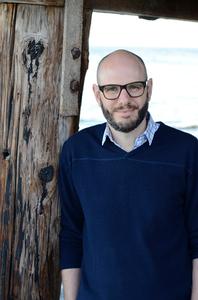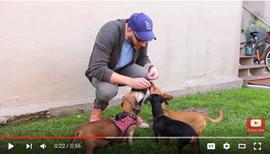
|
|
| photo: Malina Saval | |
Steven Rowley is from Portland, Maine, and is a graduate of Emerson College. He has worked as a freelance writer, newspaper columnist and screenwriter, and lives in Los Angeles with his boyfriend and their dog. He is @mrstevenrowley on Instagram and Twitter. Lily and the Octopus is his first novel.
How autobiographical is this story?
There's no way to deny that it's partly autobiographical. I did have a dog, named Lily, and when she passed away I went into a funk. The depth of grief I felt took me completely by surprise. After about six months or so feeling completely blocked, not just in writing but in life, I sat down to do what writers often do, which is try to put pen to paper and work their way out of a tough spot. Thematically and emotionally it was autobiographical, but as I kept writing, the character and the plot became more fiction. It got weird, certainly, along the way, but I thought, the story can get as weird as it wants to on the surface as long as I stick to the mission of adhering to absolute emotional honesty.
It sounds like you did the writing as a part of healing.
Oh, it was hugely cathartic. Absolutely. Although it's largely on the surface about a man and his dog, I see the story more about a character who's stuck in life. Sometimes our biggest obstacles are those that we make up, that we imagine, or if they're not entirely imagined, that we exaggerate. So it's really a story about what it takes to get unblocked and power your way though.
Did you know that that was the story before you were writing it?
It's interesting. I come from a background in screenwriting, and with screenwriting you have the plot much more laid out in advance. And this was something I was approaching from more of an emotional standpoint, looking to examine themes of grief and depression--I hate to harp on those because the book is, hopefully, not without its humor as well. I was surprised where the story took me because I was so focused on the emotion of it. There's a big set piece near the end that came completely by surprise.
Why on earth an octopus?
Well, I did have a dog that suffered from something that looked a bit like there was a small octopus on her head. But beyond that, I wanted something as different as possible. What's most different from a dog that's covered in fur, that's basically all spine (since she's a dachshund) than an invertebrate who's sort of slimy and hairless and lives in the sea? I liked playing with that dichotomy, that they were as different as different can be. On top of that, I have an enormous respect for octopuses (my editor and I have gone over this time and time, and the plural of octopus is octopuses). They're so smart, and according to scientists they're playful, can use simple tools and they learn and adapt as they go. And that's what I needed, a cunning antagonist. Because the main character learns more about the octopus throughout the story as it unfolds, I needed a villain who would learn and adapt as well, continue to know how to needle our narrator. So, that is an octopus. And I do carry some guilt about villainizing them in any way, because they're really magnificent creatures. Please everyone, don't hate the octopus. Just the particular one in this story.
 |
|
| When Steven met Lily. | |
How was writing a novel different from your previous work as a screenwriter?
Screenwriting is a collaborative art. Many people help to bring a screenplay to life as a film, and many times it's not the writer's original intent that makes it to the screen. On top of that, when you're writing a screenplay you're writing a blueprint, it's not in and of itself the final product. I had in my mind that I wanted to try a novel someday, so that if nothing else I could point to something bound and finished and say, this is what I do.
A screenwriter's job is to make the internal external. All emotion and feelings are expressed through action and dialog. In this book, I wanted to luxuriate in themes and feelings. The book is very internal; there's a very limited number of characters. The narrator has one friend, one sibling, one parent and one therapist, and that's it. He's sort of removed from humanity, which is why he has such a powerful relationship with his dog. I really wanted to take the time and explore what was going on inside of his head, and when you're exploring depression it's often internal like that. So it just seemed that a novel or prose was the right medium for this story.
Your journey to publication was unusual. Congratulations, by the way.
Thank you! When I finished the manuscript, I was very proud of it as a piece of writing, but I saw it as so deeply personal, and to be perfectly honest I was also worried that it was perhaps a little weird. Self-publishing was also attractive to me because, coming from film, I didn't want too many other voices trying to tell me it can't be an octopus, it should be an alligator, or whatnot. My boyfriend recommended I hire an independent freelance editor, so I found a woman named Molly Pisani and she and I worked on the book together. I paid her and I never expected to hear from her again. I went about doing what writers looking to self-publish do. I hired a typesetter, looked at ISBN numbers and how to market the book and sell it, all these things, and out of the blue I got a phone call from Molly about three months later. She said, "I can't stop thinking about your book. I know a woman who works at Simon & Schuster who I think might respond to it in the same way that I did. Do you mind if I send it?" I said no, I certainly don't mind, but I was so far down the line toward self-publishing that I really didn't think anything would come of it. And she did say that it could take her friend a month or two to look at it. That was on a Friday, and on Monday morning I woke up to a call from Simon & Schuster, from the woman who is now my editor, Karyn Marcus. It really happened that quickly.
What's next?
Everyone is asking, will it be a screenplay or novel? And I have to say that publishing is being incredibly kind to me right now. Working on Lily with my editor, she gave me a note once and said, "...but I defer to your creative vision." And I almost fell out of my chair! Because in 10 or 12 years really giving it a go as a screenwriter, I had never heard those words from a producer or a studio executive. As a writer, that's kind of addictive. So for many reasons, my next project, which I'm working on right now, is a follow-up novel. I've been really fortunate with this publishing deal, which has allowed me to leave my day job, and I'm focusing on writing full time now. I'm excited. --Julia Jenkins

